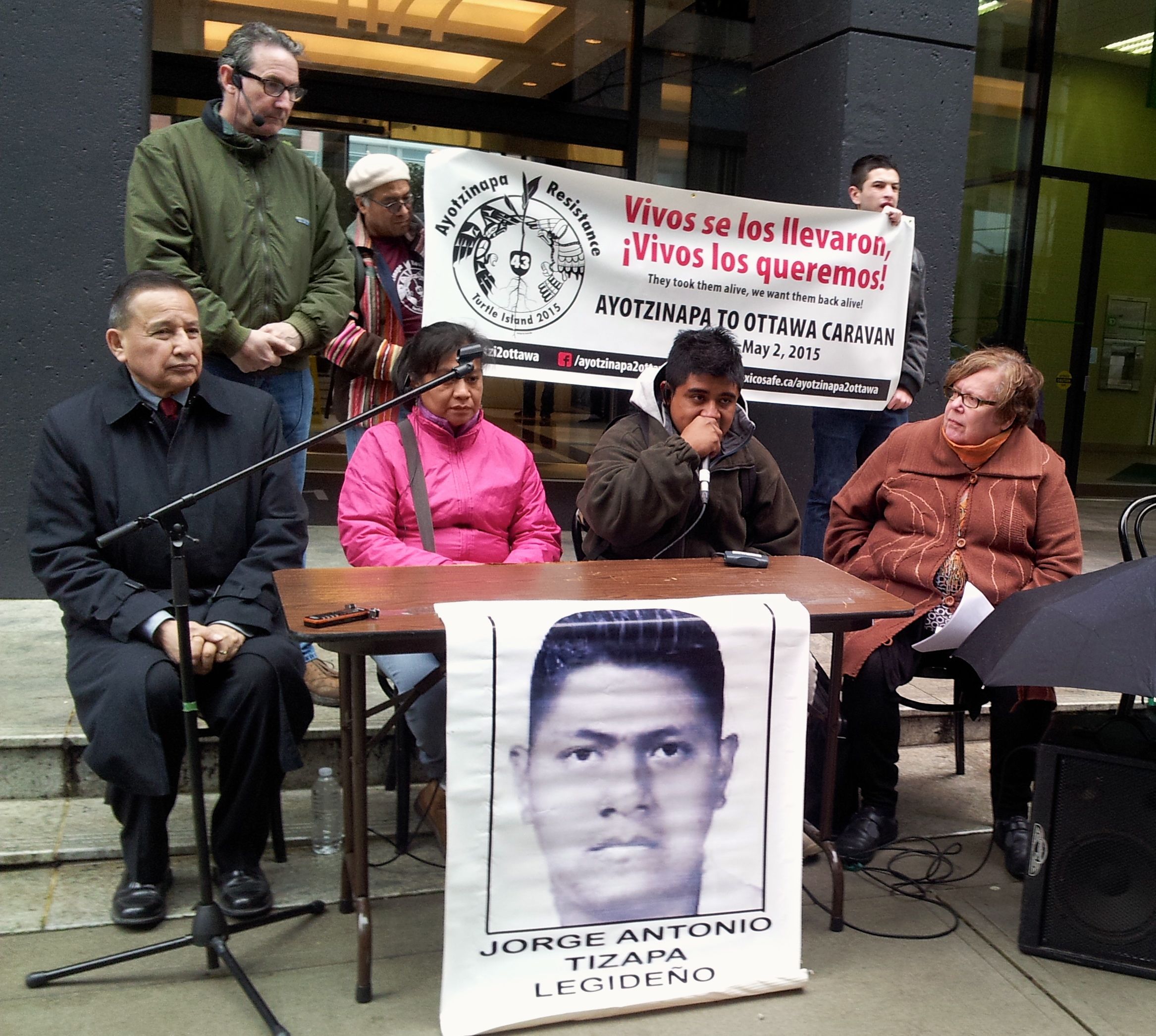Jorge Luis Clemente Balbuena, a survivor of the September 26, 2014 attack on students by Mexican police, and Hilda Legideño Vargas, the mother of one of the 43 students who was disappeared following the attack, are travelling across Canada on the Ayotzinapa to Ottawa Caravan to meet with politicians and civil society leaders.
They are asking the Canadian government to acknowledge the human rights crisis in Mexico, demand the Mexican government meet international human rights norms, review Canada’s program of cooperation with Mexico, and eliminate barriers for Mexican human rights defenders seeking protection in Canada.
On April 28, Balbuena and Legideño Vargas will testify before the Parliamentary Subcommittee for International Human Rights in Ottawa.
Seamless corruption in Mexico leaves activists in harm’s way
On April 12, Balbuena and Legideño Vargas launched the Caravan from Ayotzinapa to Ottawa by holding a public forum in front of the Mexican consulate in Vancouver.
“On Sept. 26, the Mexican state police stopped the bus we were on, told us to come down from the bus, they attacked us, they began shooting at us… from that day we have been campaigning to find our brothers. We will continue to look for our brothers no matter how long it takes. We will unmask what is going on in the Mexican state,” said Balbuena.
Balbuena, a member of the student committee of the Ayotzinapa teachers’ college in Mexico, was travelling with about 80 of his peers near the city of Iguala when their buses were attacked by state police. Six of students were killed, over 25 people were injured, and 43 students were detained, never to be seen again.
“We want to find our kids,” says Legideño Vargas whose son started training at the teachers college just two months before the attack. “We want to know what happened to them. We believe anyone with kids can understand this.”
The Mexican government has admitted that the attack on the students was carried out by state police at the command of Iguala Mayor Jose Luis Abarca and his wife Maria de los Angeles Pineda. The government says the police handed the students over to a local drug cartel, Guerreros Unidos, who murdered them.
Legideño Vargas believes the army was also involved, which the government refuses admit, preferring to blame organized crime. Legideño Vargas says that in Mexico there is little distinction between state authorities and criminals, “In Iguala we are governed by organized crime. The connection is seamless.”
Because of such links Legideño Vargas has no confidence the government will protect those who demand justice, in fact she is already facing harassment. “In Mexico no one is really safe. We have been beaten. We have been threatened,” she says.
“This is the kind of experience you face when you are involved in social movements in Mexico,” says Balbuena, who will continue to campaign for justice despite such threats. “We want to continue in social struggle. We want an education.”
Mexico a safe country? Harper thinks so.
Balbuena and Legideño Vargas are part of a movement, called Make Mexico Safe, which aims to convince the Canadian government to remove Mexico from its list of safe countries. The Conservative government created the safe, or Designated Countries of Origin, list in 2012. Citizens of countries on the list have decreased ability to seek asylum in Canada because it is assumed their countries “do not normally produce refugees, but do respect human rights and offer state protection.”
“Mexico is really not safe for anyone,” said Legideño Vargas when asked why Mexico should be removed from the list.
According to the America’s Policy Group over 22,000 people have disappeared in Mexico since 2006, though actual numbers are likely higher. Reported cases of torture by state authorities have increased by 600 per cent over the same time period.
Removing Mexico from the list would send a message to the Mexican government that Canada does not tolerate state-sanctioned or perpetrated human rights abuses, and that the Mexican government has a responsibility to protect its citizens.
The campaign is already garnering political support. Libby Davies, NDP MP for Vancouver East called on the Conservative government to demand accountability from Mexico.
“Canada has a responsibility to speak out,” she said while meeting Balbuena and Legideño Vargas in Vancouver. As one of Mexico’s largest trading partners, Davies says, Canada has the ability to pressure the Mexican government to provide a full investigation into the students’ disappearance.
Grand Chief Philip Stewart, President of the Union of B.C. Indian Chiefs was also in attendance at the Vancouver meeting, and promised Balbuena and Legideño Vargas the support of the B.C. Chiefs. “I call on Thomas Mulcair, the leader of the official opposition to raise this issue in the house. I call on the Conservative government to make a statement about the situation in Mexico and cut off relations with Mexico until human rights are respected,” he said.
Balbuena and Legideño Vargas will meet with other political leaders, as well as union leaders and civil society organizations in British Columbia, Ontario and Quebec.
Upcoming events include:
April 17, 6pm: Fundraiser at Commercial Dr. Royal Canadian Legion Hall, Vancouver
April 22, 6pm: Presentation at Université du Québec à Montréal (UQAM), Quebec
April 23, 9am: Media Briefing at the Quebec National Assembly, Quebec
April 24, 7pm: Cultural event and solidarity night at Parroquia San Esteban, Toronto
April 25, 5pm: Feast and panel discussion, Shelldale Community Centre, Guelph
April 26, 12pm: Community gathering at Six Nations
Julia is a Postdoctoral Fellow at Simon Fraser University in Vancouver, where she lectures on Canadian Foreign Policy. She holds a PhD in Peace Studies, from the University of Bradford, in the UK, and has worked in North America, Europe and Africa on issues related to human rights, development and global health. @juliaheather



